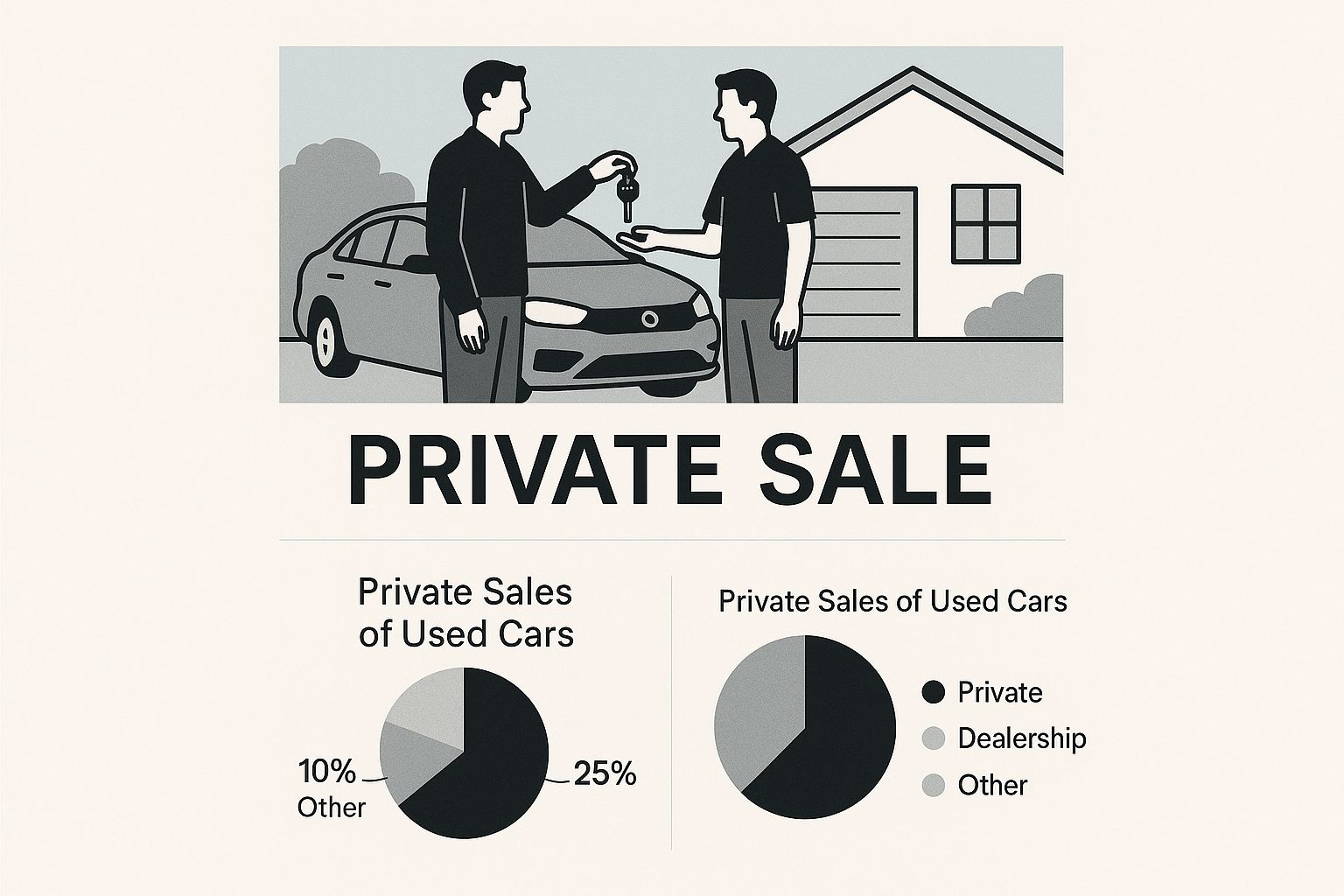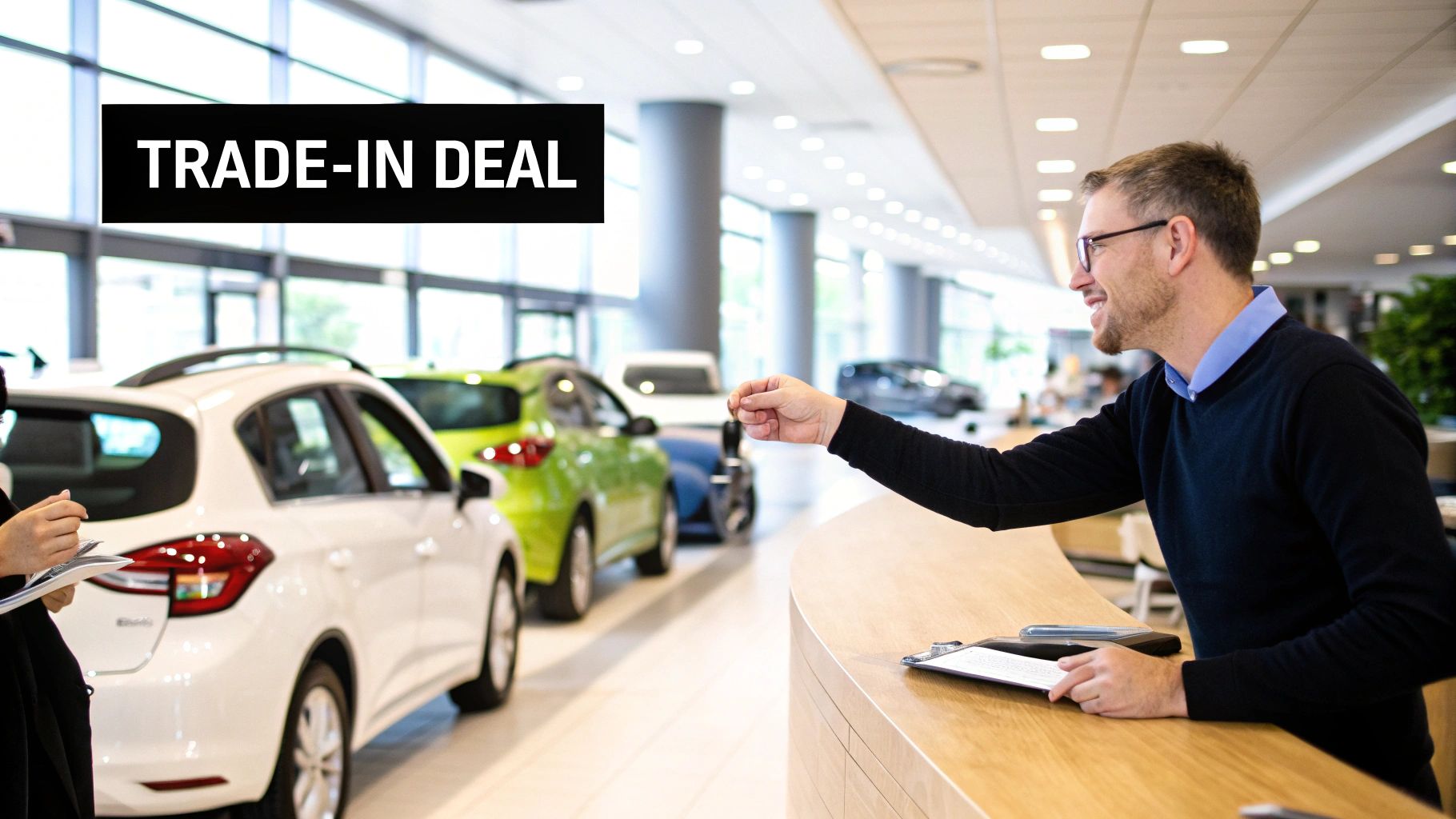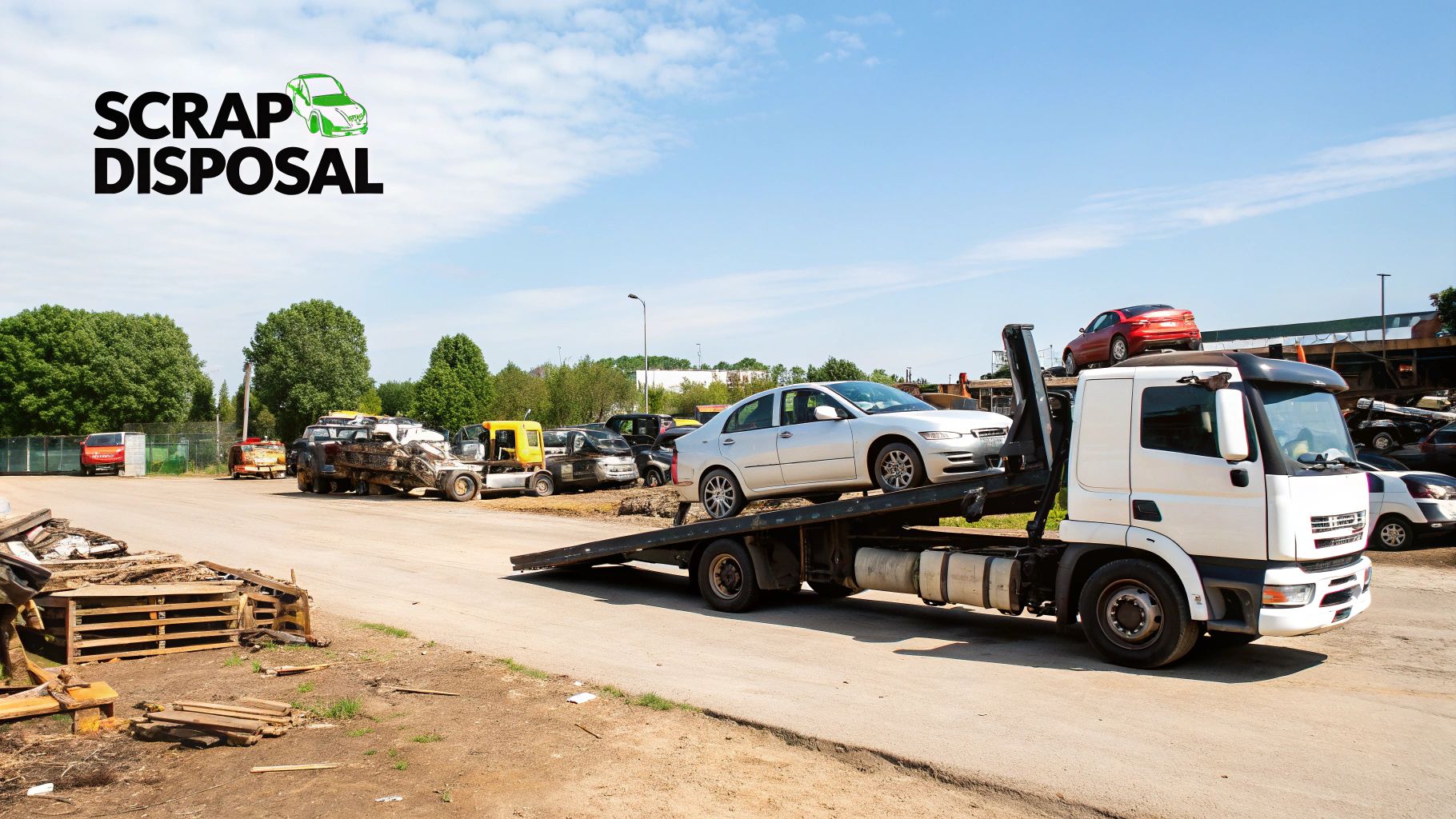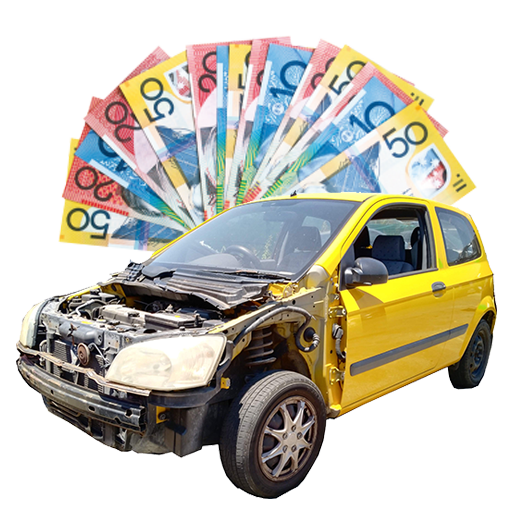So, you've decided it's time for that old car to go. It's been taking up space for too long, and you're ready to move on. But before you can get rid of it, you need a clear plan.
The whole process kicks off with two simple but crucial tasks: taking a hard, honest look at its condition and rounding up all the necessary paperwork. Nailing this prep work is what determines whether you're heading for a private sale, a trade-in, or making a call to a car removal specialist like us.
First Steps to Get That Unwanted Car Off Your Driveway
That car sitting in your driveway has officially crossed the line from being an asset to a bit of an eyesore. Before you make any big decisions, a few initial steps will make sure the whole process is smooth, legal, and maybe even puts a little cash in your pocket.
Getting these basics right from the start saves a world of headaches later, no matter if you end up selling, scrapping, or even donating it.
What’s the Real Condition of Your Car?
Alright, time for some tough love. Be brutally honest about the state of the vehicle. Does it actually run safely and reliably, or is it a non-starter with some serious mechanical gremlins?
A car that just needs a good clean and has a decent service history could be a great candidate for a private sale on a site like Gumtree. On the flip side, a vehicle with a blown head gasket, major rust issues, or significant accident damage is probably headed straight for the wreckers.
Knowing its true condition helps you set realistic expectations. You won't waste weeks trying to sell a car that's clearly scrap, and you won't accidentally undervalue a perfectly good runner.
Get Your Paperwork in Order
This part is non-negotiable. No matter where the car is going, you need the right documents to legally sign it over. Without them, the whole process grinds to a halt.
Make sure you can find:
- Proof of Ownership: This is usually your vehicle's registration certificate. It proves the car is actually yours to sell.
- Service History: A logbook full of stamps can add real value if you're trying to sell privately.
- Your Driver's Licence: You'll need this for ID when you're completing the transfer paperwork.
Don't Forget Your Personal Stuff
It’s amazing what we leave behind in our cars. This step is so important but so easily forgotten. Systematically go through every nook and cranny—the glove box, centre console, boot, and even under the seats.
Pull out any personal documents, old receipts, phone chargers, and your favourite pair of sunnies. A clean, empty car is not just more presentable, it also protects your personal information from falling into the wrong hands.
Tackling these simple steps first makes everything that follows so much easier. You'll be set up for a successful sale or a completely hassle-free scrap collection. With hundreds of thousands of cars reaching their end-of-life each year in Australia, doing it right is more important than ever. If you're interested, you can learn more about the future of Australian end-of-life vehicle policies and the massive environmental impact of responsible recycling.
Choosing Your Path: Selling a Drivable Car
If your car still runs, selling it is almost always going to put more money in your pocket than scrapping it. But the path you take to sell it makes a huge difference to both your final payout and the amount of work you'll have to do. It really comes down to a classic trade-off: convenience versus cash.
Selling privately on sites like Carsales or Facebook Marketplace usually gets you the best price. You’re in the driver's seat, setting the price and dealing directly with buyers. The flip side is that you’re responsible for everything – taking great photos, writing an ad that sells, fielding calls and texts, and handling often-tricky negotiations.
At the other end of the scale, you have the dealership trade-in. It's incredibly simple: you drive your old car in and drive a new one out. The convenience is top-notch, but you’ll get a lower price because the dealer needs to make a profit when they sell it on.
Here’s a snapshot of what a private sale looks like, which is often the go-to for getting the most cash.

This image perfectly captures the essence of a private sale—it’s a direct deal, keys for cash, with no middleman taking a cut.
Comparing Your Selling Options
Selling a car is all about turning an asset into cash, and your goal is to get the best return for a level of effort you're willing to put in. Before you jump in, it’s worth weighing up the pros and cons of the main methods available to Aussie sellers.
We've put together a simple table to break down the most common ways to sell a used car in Australia. This should help you figure out which approach fits your situation best.
Comparing Car Selling Methods in Australia
| Method | Potential Return | Level of Effort | Best For |
|---|---|---|---|
| Private Sale | Highest | High | Maximising your profit if you have the time and patience. |
| Dealership Trade-In | Lowest | Very Low | Maximum convenience when buying a new car from that dealer. |
| Used Car Buyer | Medium | Low | A quick, hassle-free sale for cash without buying another car. |
Each method has its place. Your decision really hinges on what you value more—your time or the final dollar figure you walk away with.
A private sale demands the most work but pays the most. A dealership trade-in is the fastest option but offers a wholesale price. Selling straight to a used car dealer is a solid middle ground, giving you quick cash without the pressure of buying from them.
For a more detailed look at the process, have a read of our complete guide on how to sell a car for the best price. No matter how you decide to sell, thinking about it with the right mindset and understanding a few simple strategies for liquidating assets can help you feel more confident and secure a better deal.
Handling a Car That Can No Longer Be Sold
So, your car has reached the end of the road. It’s too old, too damaged, or just too unreliable to sell to another driver. At this point, you're not looking to make a profit; you're looking for a simple, responsible way to get it off your hands. This is exactly where scrapping becomes your best option.
The good news? It's a surprisingly easy process.
Your first move is to get in touch with a specialist like us at Auto Removal Adelaide. We handle end-of-life vehicles every day. All we need are a few basic details—the make, model, year, and an honest description of its condition. From there, we’ll give you a clear, no-strings-attached quote.
Once you’re happy with the offer, we just need to schedule the free pickup. Our tow truck can often come out the very same day, sort out the last bit of paperwork, and tow your old car away. You’re left with a clear space and cash in your hand. It's that simple.

What Really Happens to Your Scrapped Car?
Most people think their car gets flattened into a metal cube straight away. While that's part of the end game, the reality is a much more careful and eco-friendly process. A professional auto recycler follows a precise dismantling procedure to get the most value out of every part while protecting the environment.
Here’s a peek behind the curtain at your car's final journey:
- Draining All Fluids: First things first, all hazardous liquids are removed. We’re talking engine oil, coolant, brake fluid, and any leftover petrol. These are all drained and disposed of following strict environmental guidelines.
- Salvaging Usable Parts: Next, our technicians give the car a thorough inspection for anything that can be reused. Components like alternators, starter motors, tyres with decent tread, and even undamaged body panels are carefully removed, cleaned up, and sold as quality secondhand parts.
- Separating the Materials: With the reusable parts gone, the bare shell is processed. The different metals, like steel and aluminium, are separated from plastics, glass, and fabrics. This ensures every material goes into the right recycling stream.
This meticulous approach means your old car doesn’t just end up in a landfill. It becomes part of the circular economy, with its materials being repurposed to create new products. This directly reduces the demand for mining and manufacturing new resources.
When you choose a professional car scrapper, you're making a genuinely sustainable choice. If you want to learn more about how it all works, our ultimate guide to scrapping a car in Australia has all the details you need to get the best value.
The Environmental Case for Responsible Scrapping
https://www.youtube.com/embed/rXvTM_598zA
Figuring out what to do with an old car is about more than just clearing space in your driveway—it’s a decision with real environmental consequences. Letting a vehicle rot in a field or sending it to a standard tip might seem like the easy way out, but it creates a toxic problem that can last for generations.
Think about what's inside that old car. Engine oil, coolant, battery acid, and brake fluid don't just disappear. If they aren't handled correctly, they seep into the soil and can poison groundwater for decades. A certified auto recycler makes sure every last drop is drained and disposed of safely, following strict environmental rules to prevent pollution before it even starts.
It's More Than Just Fluids
The liquids are only half the story. The very materials that make up the car—the plastics, rubber, and treated metals—are a huge environmental headache if they end up in a landfill. They break down incredibly slowly, leaching chemicals into the earth as they do.
This is a massive problem here in Australia. Every year, about 850,000 vehicles reach the end of the road, creating a staggering 1.36 million tonnes of waste. It's shocking to learn that despite our best efforts, nearly a third of that waste still winds up in landfills.
That’s where professional scrappers come in. When you choose a reputable service, you’re not just getting rid of junk; you’re actively participating in a solution that turns waste back into a valuable resource.
Responsible scrapping isn't just about disposal—it's about recovery. Every tonne of steel recycled saves 1,100 kilograms of iron ore and 630 kilograms of coal.
By salvaging and recycling parts, the whole process cuts down dramatically on the need to mine and manufacture new materials. It's a circular approach that shrinks the environmental footprint of your old vehicle. To get a better sense of how this all works, you can explore our detailed guide on the benefits of recycling automotive parts and see the difference it truly makes.
Don't Forget the Final Paperwork

It’s a great feeling watching that old car get towed away, but your job isn't quite done yet. There's a bit of final paperwork to handle, and this part is crucial.
Finalising the paperwork is how you officially cut your legal ties to the vehicle. It's what protects you from any surprises down the road, like fines or tolls that aren't your problem anymore. Trust me, skipping this step can turn into a real headache later on.
Tying Up the Loose Ends
Think of this as your final checklist. Ticking these boxes gives you complete legal and financial closure, so you can move on without a worry.
-
Lodge a Notice of Disposal: This should be your first priority. You need to let your state or territory’s transport authority know that you've sold the vehicle. In South Australia, this means submitting an Application to Note Disposal of a Vehicle. This simple online form officially transfers all responsibility away from you.
-
Cancel Your Registration: Did your scrapped car still have some rego left on it? You can cancel it and often get a pro-rata refund. It's a nice little bonus that can put a surprising amount of cash back in your pocket.
-
Call Your Insurer: This one's easy to forget but important. Give your insurance company a call to cancel the policy. You’ll stop paying premiums immediately and might even be due a refund for any unused portion of your cover.
Following these steps is the key to a clean break. It ensures you have no lingering legal ties to the car, which means no unexpected bills or letters in the mail. You're officially free and clear.
Your Car Disposal Questions Answered
When it's time to say goodbye to an old car, a few common questions always pop up. It's completely normal to wonder about things like missing paperwork or how we actually work out a cash offer. Getting these details straight can make the whole process feel much clearer.
A big one we hear a lot is, "What if I can't find my registration papers?" Don't stress. While having them is ideal, it's usually not a showstopper. We can typically verify you're the owner with your driver's licence and the car's Vehicle Identification Number (VIN).
How Do You Calculate My Cash Offer?
It’s fair to ask how we land on a specific dollar amount for a scrap car. It's definitely not just a guess; there’s a method to it based on a few key things.
The value really comes down to a mix of factors:
- The Car's Weight: The sheer amount of scrap metal is the biggest piece of the puzzle. Heavier cars generally mean more metal.
- Make and Model: Some cars are packed with parts that are still in high demand. If your vehicle has components we can easily salvage and resell, that boosts the offer.
- Overall Condition: Even on a scrap car, certain elements add value. Things like a complete set of alloy wheels or an intact catalytic converter can definitely bump up the price.
We weigh up the current scrap metal prices against the potential for salvaging parts to give you the most competitive quote we can.
A common crossroads for people is deciding whether to scrap their non-running car or donate it. Donating is a fantastic gesture, but most charities are looking for cars they can sell quickly. If your vehicle has serious mechanical problems, scrapping is often the more practical and financially sound choice.
It’s also worth thinking about the environmental side of things. Did you know that Australia produces around 160,000 tonnes of plastic waste from end-of-life vehicles every year? Professional, responsible recycling makes sure that material gets a second life instead of just ending up in a landfill. If you're curious, you can discover more insights about sustainable vehicle recycling to see how the process works behind the scenes.
When you’re ready for a no-fuss, honest quote for your old car, give Auto Removal Adelaide a shout. We handle the free towing and pay you on the spot, making it as simple as it should be. Find out what your car is worth today at https://autoremovaladelaide.com.au.


